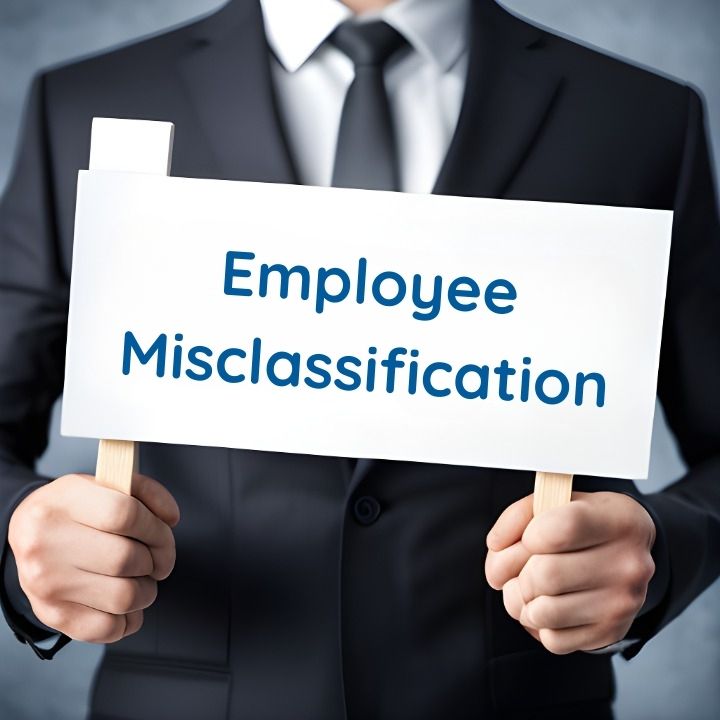Understanding Worker Classification: Protecting Your Business from Legal Risks
Has your business ever faced the challenge of a former contractor threatening legal action, claiming they were actually an employee? This is a common issue many companies encounter in the United States, where worker classification disputes often lead to lawsuits and government audits. Such disputes not only consume valuable resources but also pose significant risks to your company’s financial and reputational standing.
At "Legal Marketplace CONSULTANT," we recognize the complexities that come with worker classification and are here to help you navigate this critical legal area. Our expert legal team specializes in reviewing contracts, clarifying employment statuses, and defending your business against misclassification claims before these issues escalate. Additionally, we assist in structuring compliant agreements tailored to meet federal and state regulations, thereby minimizing future risks.
What is Worker Classification and Why Does It Matter?
Worker classification refers to determining whether an individual providing services to your business is considered an employee or an independent contractor. This distinction is crucial because it affects payroll taxes, benefits, liability, and legal compliance. Misclassification can result in penalties, back taxes, and costly litigation.
Under U.S. labor laws, employees are entitled to various protections, including minimum wage, overtime pay, health benefits, and unemployment insurance. Independent contractors, however, operate under different rules, generally bearing responsibility for their own taxes and benefits. Incorrectly classifying an employee as a contractor can expose your company to claims for unpaid wages, tax liabilities, and statutory damages.
Common Triggers for Worker Classification Lawsuits
Disputes often arise when former contractors assert that they should have been classified as employees. Some common triggers include:
- Lack of clear written agreements defining the nature of the working relationship.
- Degree of control the company exercises over the worker’s tasks and schedule.
- Provision or requirement of specific tools and equipment by the company.
- Significant dependence of the worker on the company as their sole business client.
- Duration and permanency of the work relationship.
How Legal Marketplace CONSULTANT Can Help
Our team offers comprehensive services to ensure your worker classifications are accurate and legally compliant, including:
- Contract Review: We thoroughly examine your existing contracts to identify and correct any ambiguities related to worker status.
- Employment Status Analysis: Utilizing federal and state criteria, we assess whether each worker should be classified as an employee or independent contractor.
- Legal Defense: In cases of misclassification claims or audits, we provide professional representation and advocacy to protect your business interests.
- Agreement Structuring: We draft clear, enforceable agreements that outline roles, responsibilities, and the nature of the working relationship to prevent future disputes.
- Training and Guidance: We educate business owners and human resources teams about compliance matters and best practices related to worker classification.
Key Factors Considered in Worker Classification
The determination of worker classification typically involves evaluating multiple factors. The Internal Revenue Service (IRS) uses a multi-factor test focusing on behavioral control, financial control, and the type of relationship:
- Behavioral Control: Does the company control or have the right to control what the worker does and how they perform their tasks?
- Financial Control: Does the company control the business aspects of the worker’s job, such as how they are paid, whether expenses are reimbursed, and who provides tools or supplies?
- Type of Relationship: Are there written contracts describing the relationship? Are benefits offered? Will the relationship continue indefinitely or only for a specific project?
No single factor determines classification; rather, the overall relationship guides the decision. Professional legal advice is crucial to interpreting these factors correctly and applying them to your business context.
Risks of Worker Misclassification in 2025 and Beyond
In 2025, regulatory agencies are increasing scrutiny of worker classification practices. The Department of Labor (DOL), IRS, and state labor departments have intensified enforcement actions, including audits and penalties, focusing on gig economy workers and freelance contractors.
Misclassification can result in significant financial consequences, including:
- Payment of back wages and overtime.
- Repayment of employment taxes with interest and penalties.
- Payment of employee benefits retroactively.
- Legal fees, fines, and potential damage to your company’s reputation.
Best Practices to Prevent Worker Classification Disputes
Preventing worker classification disputes starts with clear, consistent policies and documentation. Our recommendations include:
- Use written contracts that explicitly define the nature of the relationship and expectations.
- Avoid controlling how contractors perform their work; focus on the outcome rather than process.
- Ensure contractors provide their own tools, equipment, and supplies when possible.
- Limit long-term engagements that resemble permanent employment relationships.
- Regularly review classification statuses, especially when roles or work arrangements change.
How to Respond If Facing a Misclassification Claim
If your business is confronted with a misclassification claim or audit, taking prompt and strategic action is vital. We advise the following steps:
- Retain experienced legal counsel knowledgeable in labor and employment law.
- Gather all relevant documentation, including contracts, payment records, and correspondence.
- Conduct an internal audit to review all worker classifications and identify potential issues.
- Communicate clearly and transparently with the claimant or agency, avoiding admission of liability.
- Consider mediation or settlement options to resolve disputes efficiently when appropriate.
Why Choose Legal Marketplace CONSULTANT?
Our firm is committed to providing comprehensive legal support to businesses confronting the complexities of worker classification. Our strengths include:
- Experienced attorneys skilled in employment law and regulatory compliance.
- Personalized service tailored to your industry and company size.
- Proactive risk management to prevent legal disputes.
- Strong defense strategies for audits and litigation.
- Ongoing education and support to keep your business compliant and informed.
Conclusion
Worker classification is a critical legal issue that can have far-reaching consequences for your business. By understanding the distinctions between employees and independent contractors, implementing clear contracts, and seeking expert legal guidance, you can protect your company from costly lawsuits and regulatory penalties.
Legal Marketplace CONSULTANT is here to support your business with expert contract reviews, classification analysis, and defense services, ensuring compliance in 2025 and beyond. Don’t let confusion over roles jeopardize your operations—partner with us to create clear, enforceable legal documentation that safeguards your company’s future.
Legal Marketplace CONSULTANT — your trusted partner in comprehensive legal services for business. Our team includes attorneys, legal advisors, tax consultants, and auditors dedicated to protecting your company’s interests in all aspects of labor law compliance.































